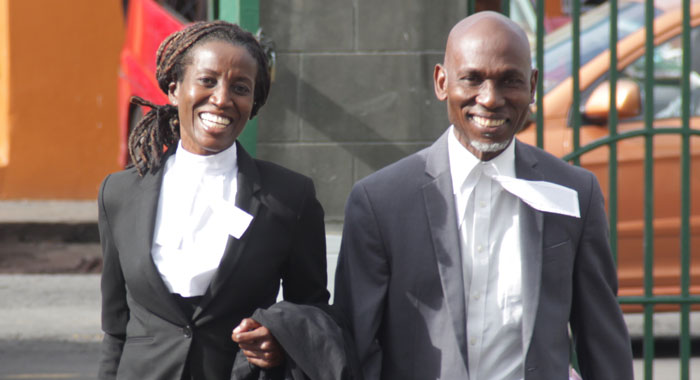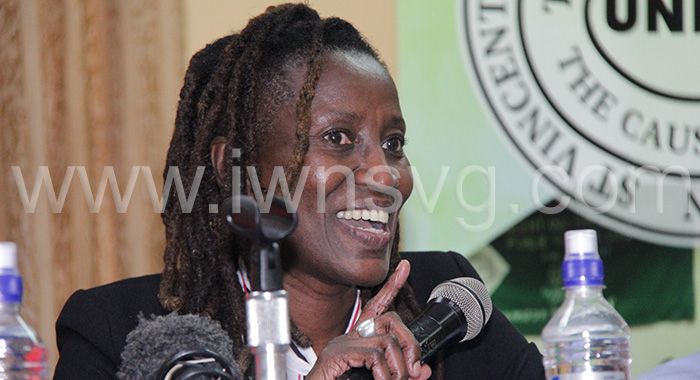Lawyers for the public sector unions in the “Vaccine Mandate Case” have urged them to appeal to the London-based Privy Council, saying that the 2-1 majority decision in favour of the government essentially means two justices of appeal agreed with the government and two with the unions.
On Wednesday, Justices of Appeal Eddy Ventose and Paul Webster ruled in favour of the government while Justice of Appeal Gerhard Wallbank dissented, describing the government’s action as “draconian”.
The majority judgment overturned the March 2023 ruling of then-High Court judge, Justice Esco Henry, who has since been appointed to the Court of Appeal.
In an online briefing of members of the St. Vincent and the Grenadines Teachers Union on Wednesday evening, Dominica lawyer Cara Shillingford-Marsh, who argued the appeal on behalf of the public sector union said her team believes that Justice Wallbank’s dissent was correct.
“He essentially recognised that by passing these regulations, the Minister [of Health] purported to change the definition of abandonment, because ordinarily, based on basic common sense, if you prevent someone from entering the workplace, you make it a criminal offence for the person to enter the workplace, you cannot then turn around and say that this individual has abandoned his position,” Shillingford-Marsh said.
“So, we think that the reasonings given by Justice Wallbank and similar to the judgment of Justice Henry, these are very valid.”
The St. Vincent and the Grenadines Teachers’ Union, Public Service Union, and the Police Welfare Association sponsored a lawsuit against the government after hundreds of public sector workers lost their job in December 2021 because they did not take a COVID-19 vaccine.
In a March 2023 judgment, Justice Henry held that vaccine mandate breached natural justice, contravened the Constitution, was unlawful, procedurally improper, and void and that the workers did not cease to hold their jobs.
Shillingford-Marsh pointed out that on the issue of the right to be heard, the right to natural justice, Justice Wallbank agreed with Justice Henry, who said that there was a right to be heard and that this right was infringed.
“So that being said, we think that it is an important area of law. We know that there has been litigation around vaccine mandates in many parts of the world, many of which have been successful. We were successful in the High Court, and we have one judge from the Court of Appeal who agreed with us.
“So in a sense, you have two judges from the Court of Appeal who are of one view, and then you have one judge from the High Court, who, coincidentally, now sits on the Court of Appeal, and Justice Wallbank, who are of the other view. So, you have two verses two, essentially.”
She said that in such a situation and considering what was at stake, including the fact that the former public sector workers have been out of the workplace “suffering greatly for the past three years, … we are of the considered view that this is a decision which should be appealed”.
The lawyer said the legal team appreciates that there are other trade unions involved and would have to consider their option on whether to move to the country’s highest court.

Vincentian lawyers Jomo Thomas and Shirlan “Zita” Barnwell as well as Joseph Ewart Layne of Grenada, the other member of the union’s legal team were also on the online forum on Wednesday.
Thomas said Shillingford-Marsh’s comments encapsulated the views of the attorneys.
He pointed out that in his dissent, Justice Wallbank speaks to the issue of proportionality.
“And I think that is a solid point as well and particularly in the context where we look at the way in which other governments across the region, 13 other countries in CARICOM had responded, and for this court to find that the government’s action was proportionate to the threat, I think is really, really a stretch, a reach.”
He said that was a solid point that needed to be raised with union members “so that they can have some hope that Justice Wallbank’s dissent is a major cornerstone upon which we can consider launching an appeal to the Privy Council”.
Thomas said Wallbank’s dissent was significant because the Court of Appeal in the Eastern Caribbean tends to be “a court of concurrence”.
“And for a judge to feel sufficiently strong to articulate his views in the ways in which he articulated this on such an important issue of national, regional import, I think is significant. It’s a significant departure from what generally happens, where the other two judges simply concur with the judge who’s writing the decision,” Thomas said.
Shillingford-Marsh pointed out that St Vincent is the only Caribbean country that instituted a COVID-19 vaccine mandate.
“… and certainly, the only country which went as far as terminating the employment of persons on the basis that because they refused to receive the vaccine.”
Meanwhile, Layne noted that Justice Wallbank used the word “draconian” in his dissent.
Justice Wallbank said, “… giving public and police service employees an ultimatum that if they did not get vaccinated, they would lose their jobs, was draconian”.
Layne said that it says a lot when an Englishman puts the word “draconian” in a judgment, adding that to get around the proportionality issue, the two judges who agreed with the government essentially said that people who have had accrued pension rights can pursue them.
“It is something we need to discuss with the litigants. … But I think that, essentially, like Cara articulated, this is really a matter that cries out for appeal, so that the final court, the apex court, can consider those issues, because, put it this way, we may have other viruses in the future.”
Layne told the forum that there are tight deadlines in appealing to the Privy Council and that the final determination might come in about 18 months.
He, however, noted that it took almost two years between Justice Henry’s decision and that of the Court of Appeal.

Meanwhile, Barnwell said she agreed with the other members of the legal team that the decision should be appealed to the Privy Council, saying it is “… a dangerous precedent.
“And given the way that things are in the world right now, we want to make sure that nothing like this happens again…”
She said the mandate was “oppressive and unjust” but the Court of Appeal said it was law and there was nothing that the people can do about it.
“… everybody in the region was looking for the results of this decision.”
Barnwell noted that after handing down her ruling in March 2023, Justice Henry had said that she anticipated that it would be appealed.
“… there is a cost attached, yes, but I think it’s something that we have to take further,” Barnwell said.
President of the Teachers Union, Oswald Robinson, told the online gathering that the public sector unions would meet on Thursday to determine the way forward.
“We are not going to use the ruling today as a setback…’ Robinson said.
“Many people may have been disappointed, but out of disappointment, we have to move on to the higher level, to the next step, and as the President of the Teachers’ Union, and I’m going to reach out to my membership, and I’m going to encourage the other colleagues to do likewise so that we could continue to work together to ensure that we have justice for the workers for the Caribbean and that we do not allow any precedent to be set that would deprive us of our fundamental rights and freedom and all the issues that you have raised,” Robinson said.







These lawyers are just hungry for money.
The majority opinion of the court of appeal was based on a well reasoned interpretation of the Constitution and other legislation.
This verdict need to be exam from a constitutional violation